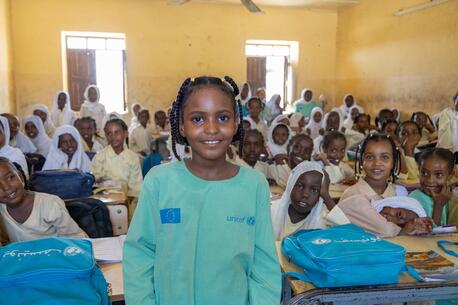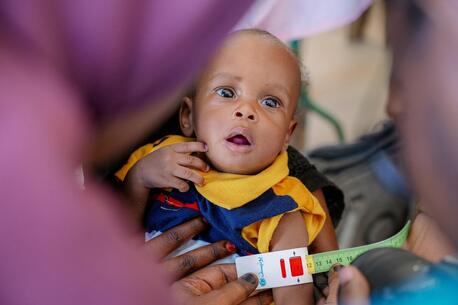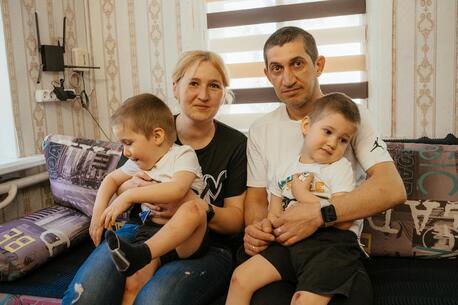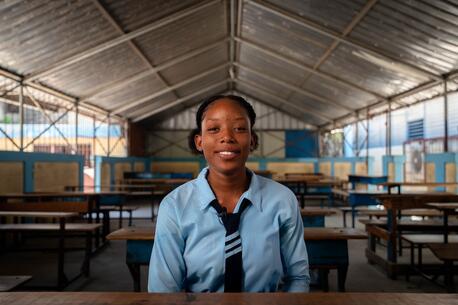
Catch-Up Classes Help Haiti's Children Prepare for a Better Future
Catch-up classes offer girls and boys in Haiti the opportunity to continue their education despite ongoing violence. The classes are provided through an Education Cannot Wait-backed program delivered by UNICEF, WFP and local partners to improve access to continuous, quality education.
Students are finding their way back to the safety and security of the classroom
In the face of enormous violence, kidnappings and utter chaos in Haiti, there is the promise of a better tomorrow.
With catch-up classes, school feeding programs and other integrated holistic education supports, girls like Renée Kaëlle, 18, are finding their way back to the safety and security of the classroom through a unique multi-year program delivered by UNICEF, the World Food Program (WFP) and other local partners with funding from Education Cannot Wait (ECW), the global fund for education in emergencies and protracted crises hosted by the United Nations.
Like many young women her age, Renée has big dreams for the future. She wants to be a diplomat to represent her country on the global stage. But first, she needs to graduate from high school. She was on track before the recent wave of violence hit Haiti.
Her neighborhood, Pétion-Ville, sits on the hills east of the nation's capital, Port-au-Prince. This was always known as a safe and quiet neighborhood, the kind of place where women and girls could gather in the afternoon sun to discuss the day and share their hopes and aspirations for the future. But the recent wave of violence forced many of the schools in Pétion-Ville to close.
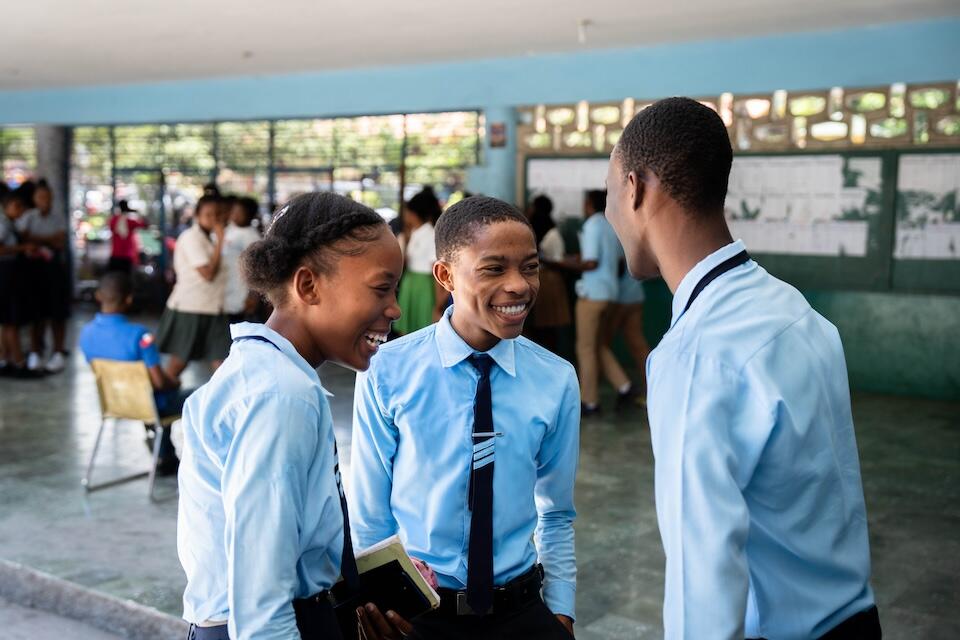
Unprecedented levels of lawlessness and brutality
“Pétion-Ville experienced the same climate of insecurity as other areas. Insecurity, banditry, kidnappings, shooting. Armed groups subjecting people to things they should not experience. That’s why my school was closed,” says Renée. “It’s really sad for final year students like us who have to take our final exams as we could not attend classes the way we should. How will we take the exams? What will we write on our tests without having attended class?”
Renée is not alone. Over the past year, Haiti has seen unprecedented levels of lawlessness and brutality at the hands of coalitions of armed groups. The compounding impacts of climate change, recurring cyclones and the most recent earthquake have made matters even worse. In all, nearly half of Haiti’s population — some 5.5 million people — are in need of humanitarian aid, and 5 million people are going hungry. Armed groups are targeting schools and other public institutions, with concerning reports of sexual violence. Gang rape, sexual exploitation and other atrocious forms of gender-based violence are being reported on a regular basis. Tragically, the UN estimates that 30 to 50 percent of armed group members could be children that have been forced or coerced into joining.
For many, it’s a future without exit, a future without hope.
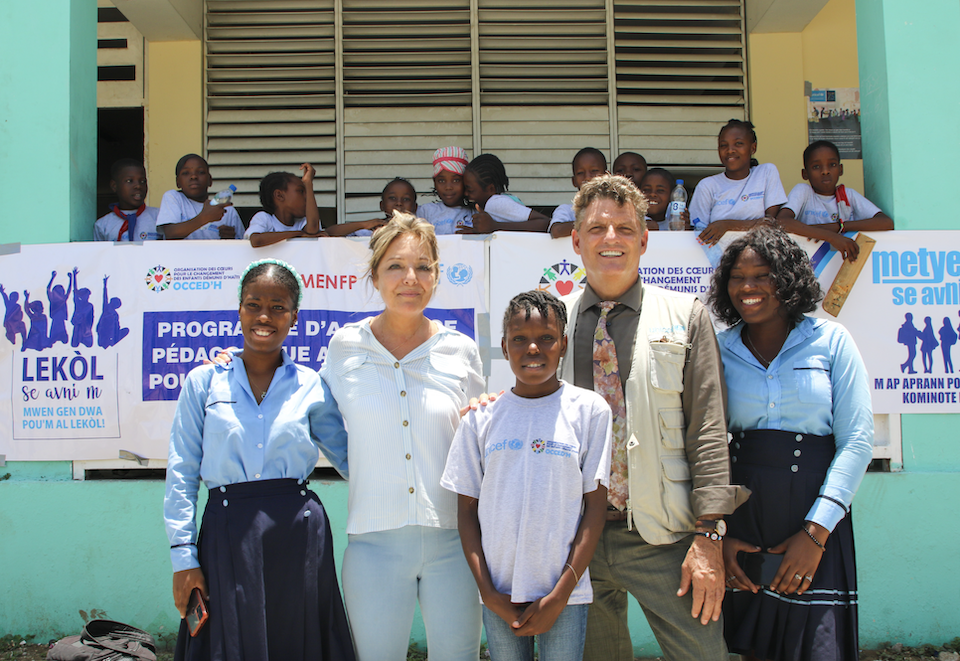
Hundreds of schools are closed or being used as displacement centers
In all, about 1.2 million children are in urgent need of quality education. Hundreds of schools are being closed or used as displacement centers across the country. An estimated 919 schools are closed in the Ouest (home to Port-au-Prince) and Artibonite departments alone.
“The education crisis unfolding in Haiti is seriously close to becoming an education tragedy,” says Bruno Maes, UNICEF Representative in Haiti. “While enrollment rates were already low before the latest escalation of violence, school closures and mass displacement are robbing thousands more children of their opportunity to learn. Hence, UNICEF is grateful to Education Cannot Wait for the continued support and commitment to ensure every child in Haiti has access to quality and safe learning.”
Despite these urgent needs, the $30 million requirement for the education response as part of the country’s humanitarian response plan is only 30 percent funded, according to OCHA, the United Nations Office for the Coordination of Humanitarian Affairs.
World leaders must not turn their backs on the girls and boys of Haiti. — Yasmine Sherif, Executive Director of Education Cannot Wait
“World leaders must not turn their backs on the girls and boys of Haiti,” says Yasmine Sherif, Executive Director of Education Cannot Wait. Sherif visited Haiti in late July, along with representatives from the Government of Haiti, UN Haiti, UNICEF, WFP, OCCED'H and other strategic partners, to meet with girls and boys, assess the situation and align a long-term strategy to improve access to quality education for the children impacted by this ongoing and remarkably complex crisis.
“These children, teachers and families have seen their human rights and human dignity ripped from their hands by brutal acts of violence, disorder and chaos. With the power of education, we can protect these girls and boys from the grave risks of sexual violence, forced recruitment in armed groups and other human rights violations. With the power of education, we can lift up an entire nation from a never-ending cycle of hunger, poverty, economic uncertainty and violence,” says Sherif.
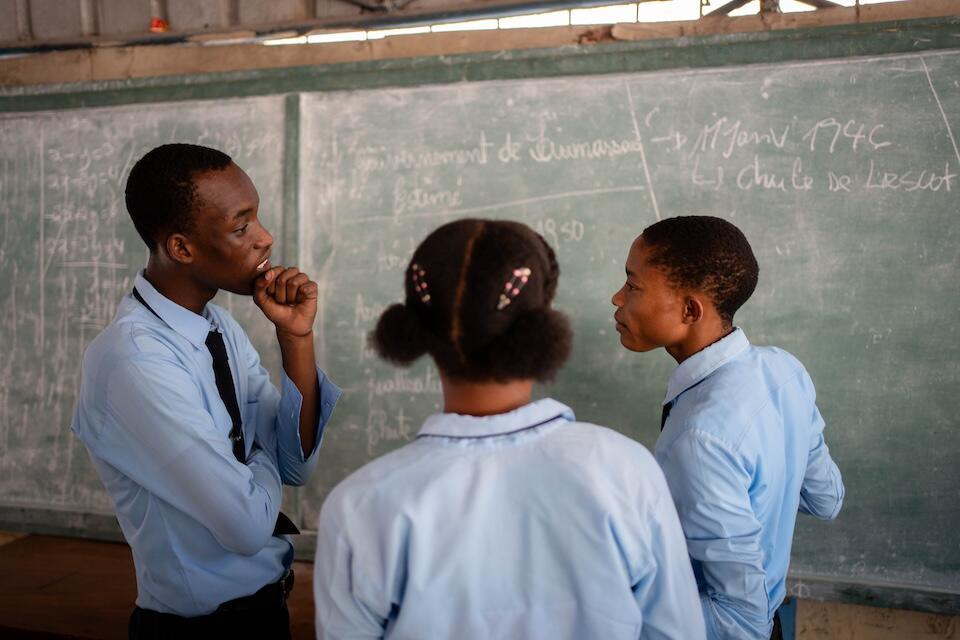
Education Cannot Wait funds life-changing education programs in Haiti
Education Cannot Wait has been funding lifesaving education programs in Haiti since 2021. The programs are delivered by a consortium of partners including the Government of Haiti, UNICEF and WFP. In all, $15 million in catalytic grants have already been allocated, including a recent $2.5 million First Emergency Response grant launched by UNICEF, WFP, ECW and other strategic partners during the high-level UN mission.
The investments include innovative cash transfers, back-to-school incentives, school feeding programs, early childhood education, disability inclusion, transformative gender approaches, mental health and psychosocial support, environmental sensitization activities and other holistic education offerings designed to ensure girls and boys have access to safe and protective quality learning environments.
Education is an investment in a more secure and peaceful future
For Renée, the investments meant a return to the classroom, and the real opportunity of graduating from high school this year.
“The state decided to launch catch-up classes in every school on Saturdays and Sundays. The teachers work well and teach us well. And although we cannot catch up completely, at least we can try to make up for some of the time we lost without going to school,” says Renée, a sparkle of hope crossing her face. “If there were no catch-up classes, I think that, yes, we would participate in the exams and maybe succeed. But there are concepts on which we would not perform well. We would not know them.”
Much more needs to be done.
“While some of us had the opportunity to return to school, there are others who do not have this opportunity, because of the insecurity that the country is experiencing, because of internal displacement or because parents do not have enough means to send their children to school,” says Renée.
To provide crisis-affected girls and boys around the world with access to quality, holistic education, Education Cannot Wait and its partners, including UNICEF, are calling on world leaders to urgently mobilize an additional $600 million.
With these expanded resources, ECW, UNICEF and other partners can reach 20 million children by 2026. It’s an investment in peace and security in countries like Haiti that have been plagued by violence. It’s an investment in a better tomorrow.
Every child has the right to to a quality education and the opportunity to reach their full potential. Please donate today.
HOW TO HELP
There are many ways to make a difference
War, famine, poverty, natural disasters — threats to the world's children keep coming. But UNICEF won't stop working to keep children healthy and safe.
UNICEF works in over 190 countries and territories — more places than any other children's organization. UNICEF has the world's largest humanitarian warehouse and, when disaster strikes, can get supplies almost anywhere within 72 hours. Constantly innovating, always advocating for a better world for children, UNICEF works to ensure that every child can grow up healthy, educated, protected and respected.
Would you like to help give all children the opportunity to reach their full potential? There are many ways to get involved.



